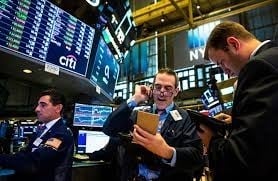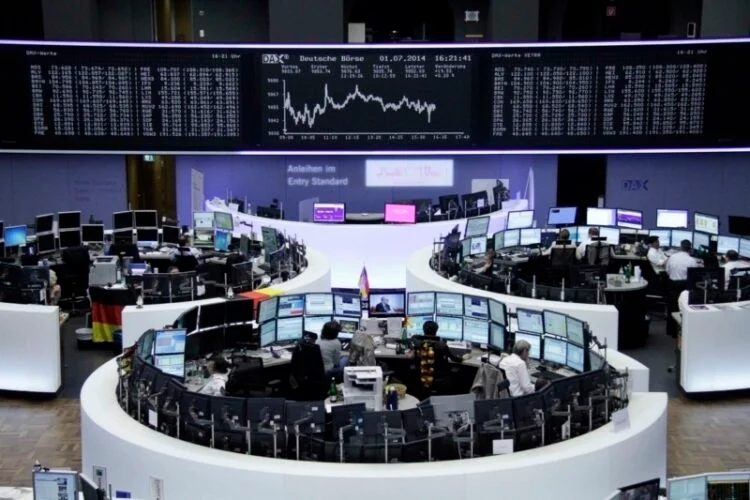Publisher: Maaal International Media Company
License: 465734
US indices deepen losses at the end of the week as Trump’s tariff crisis escalates
US stock markets suffered billions of dollars in losses at the end of trading this week following US President Donald Trump’s imposition of tariffs on Wednesday, which have shaken the global economy.
Following comments by US Federal Reserve Chairman Jerome Powell about the risks of rising inflation due to tariffs, US stock indices continued their losses under the weight of prolonged concerns about the repercussions of “reciprocal tariffs.”
The Dow Jones Industrial Average entered correction territory after falling 2,063 points, or 5.1%, on Friday, marking its largest decline since June 2020 during the pandemic. This follows a 1,679-point drop on Thursday, bringing the decline from a record high of 14%.
اقرأ المزيد
The Standard & Poor’s 500 Index fell 5.6%, also its largest decline since June 2020. The benchmark index lost 4.84% on Thursday and is now 17% below its recent high. The Nasdaq Composite Index, which includes many technology companies that sell to and manufacture in China, also lost 5.4%. This follows a decline of about 6% on Thursday. This index is 22% below its December record high, a term Wall Street term for a “bear market.”
During the day, the Federal Reserve Chairman said that tariffs will likely increase inflation in the coming months, indicating that the outlook is highly uncertain amid growing risks of rising unemployment and inflation.
U.S. stocks fell sharply on Friday amid a massive sell-off after China retaliated with new tariffs on American goods, raising concerns that a trade war will push the world into recession. As the trade war escalated and recession fears intensified, the Fear Index jumped more than 50%, recording its highest daily close since the height of the COVID-19 pandemic. Federal Reserve Chairman Jerome Powell’s remarks on Friday also added to the uncertainty surrounding the economic outlook. He predicted that President Donald Trump’s tariffs would lead to higher inflation and lower growth, and indicated that the central bank would not make any adjustments to interest rates until the final picture was clear.
In a speech to business journalists at the annual SABEW conference in Arlington, Virginia, Powell said the Federal Reserve faces a “very uncertain outlook” due to the new reciprocal tariffs announced by the president on Wednesday.
While he said the economy currently appears strong, he emphasized the threat posed by the tariffs and indicated that the Federal Reserve would focus on keeping inflation under control. Trump’s tariffs led to the worst day for markets since 2020. The S&P 500 fell nearly 14% from its February high on Thursday, sending the market back into correction territory.
The small-cap Russell 2000 also fell more than 6% on Thursday, becoming the first widely followed US stock index to enter a bear market, a drop of at least 20% from its previous peak.
Trump held his ground in the face of the market reaction, posting on his Truth Social platform on Friday that his “policies will never change” and called on investors to increase their investments in the United States.
Tech stocks suffered heavy losses, led by Tesla and Nvidia, after China’s retaliatory tariffs, in response to US President Donald Trump’s tariffs, fueled fears of a global trade war. Nvidia shares fell more than 7%, and Tesla shares fell more than 9% during trading on Friday, April 4.
Meta shares fell by about 4%, while Amazon shares suffered relatively smaller losses of about 2%, and Alphabet shares fell by about 1%. iPhone maker Apple lost about 4.90%.
These losses follow a broad sell-off in the markets on Thursday. President Donald Trump’s sweeping tariff policy sparked market panic and fears that the US economy could slide into recession.
The number of losing stocks outnumbered rising stocks on Friday, as investors sought safety after China’s retaliatory tariff measures. FactSet data showed that more than 17 New York Stock Exchange-listed stocks declined for every gainer. Overall, 2,494 stocks declined, while only 143 advanced.








